#theosis and union with God
Text
Reflections on the Feast of Exaltation of the Holy Cross - September 14
Delve into the profound significance of the Feast of the Exaltation of the Holy Cross in Orthodox Christianity. Explore its historical context, theological implications, and relevance in modern times.
In the name of God the Father, Christ Jesus His Son and the Holy Spirit, One True God. Amen.
But God forbid that I should glory, except in the cross of Our Lord Jesus Christ, by whom the world is crucified to me and I to the world.
Galatians 6:14
Dear brothers and sisters in Christ
On September 14 of every year, the Church as a whole celebrates the Feast of the Exaltation of the Holy Cross.…
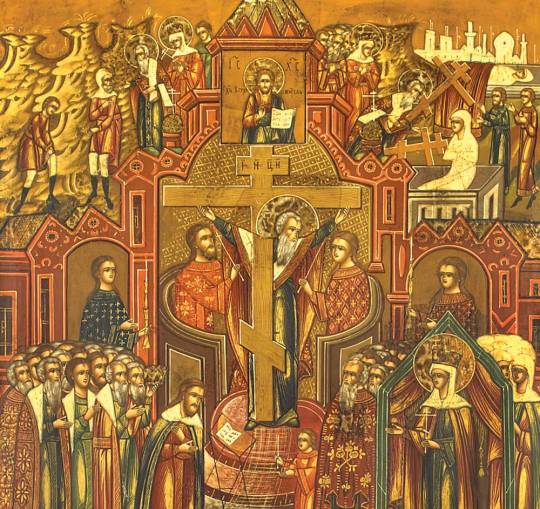
View On WordPress
#bearing our crosses#crucifixion of Jesus#Feast of the Exaltation of the Holy Cross#featured#historical context#hope in difficult times#hymns and prayers#liturgical celebrations#Orthodox Christian reflection#Orthodox faith#restoration through forgiveness#St. Helena&039;s Discovery#the Tree of Life#theological significance#theosis and union with God#veneration of the Cross#victory over death
0 notes
Text
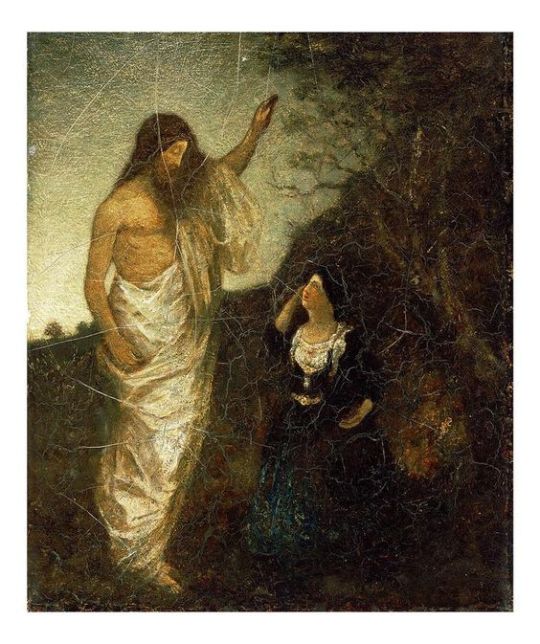
“I am in God, and God is in me. I feel that all creatures, the trees, the flowers belong to God and also to me.
I no longer have a will, it belongs to God. And all that is God´s is mine.”
~ St. Mariam of Jesus Crucified, The Lily of Palestine, O.C.D. (1846-1878)
(Art: Resurrection, by Albert Pinkham)
#Resurrection#Christian art#saints#St. Mariam of Jesus Crucified#The Lily of Palestine#My will belongs to God#union with God#Lord Jesus Christ#theosis
45 notes
·
View notes
Text
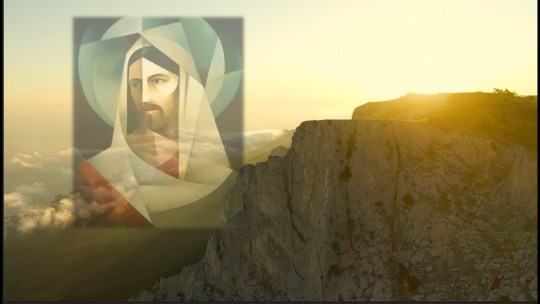
Follow Me: The Call to Every Soul
#Mystical Christianity#Theodore J. Nottingham#Yeshua#John 1: 43-51#Theosis#Gnosis#Union with God#Spiritual Awakening#The Presence of God#The Presence of the Holy#Christ Consciousness#The Beauty of Life#The Life-Giving Word
0 notes
Text
The Third Eye is a Window to the Heavens - Spiritual Awakening Radio Podcast
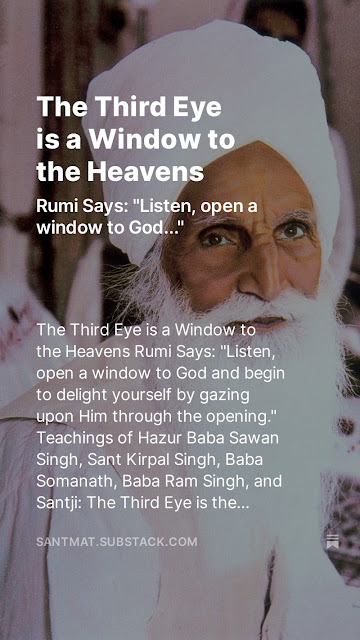
Rumi Says: "Listen, open a window to God and begin to delight yourself by gazing upon Him through the opening."
Teachings of Hazur Baba Sawan Singh, Sant Kirpal Singh, Baba Somanath, Baba Ram Singh, and Santji: The Third Eye is the Portal to the Heavens and Simran is the Key.
"Recognize the Path to your Beloved, O travelers and take the route of the anguished lover in separation. Keep the Master’s grace in your thoughts, and reflect upon his pure teachings. Develop love and devotion with endearment, and keep the thought of the Creator always before you. Try to merge yourself into God like water and water. Fix your mind within by following the Path of the Sound Current. A yearning will arise; make then an intense and anguished call. Repeat the Name of your Beloved, day and night, again and again and again. With care in thought, word and deed, you will cross to the other shore." (Dadu Dayal, the Compassionate Mystic)
The Third Eye is a Window to the Heavens - Spiritual Awakening Radio Podcast - Listen or Download MP3 @
https://traffic.libsyn.com/spiritualawakeningradio/Third_Eye_Portal.mp3
@ the Podcast Website With Buttons That Go To the Popular Podcast APPS - Wherever You Follow Podcasts:
https://SpiritualAwakeningRadio.libsyn.com/thethirdeyeisawindowtotheheavens
@ Apple Podcasts:
https://podcasts.apple.com/us/podcast/the-third-eye-is-a-window-to-the-heavens/id1477577384?i=1000644318182
Collection of Spiritual Awakening Radio Podcasts @ Apple:
https://podcasts.apple.com/us/podcast/spiritual-awakening-radio/id1477577384
@ Spotify Podcasts:
https://open.spotify.com/episode/3e9rR2Siy3Iqpp8fpBot2J
@ Amazon Music and Podcasts:
https://music.amazon.com/podcasts/ca7918b0-4005-4724-a2e5-b27f51ecdba6/spiritual-awakening-radio
& @ Wherever You Subscribe and Follow Podcasts - At Your Favorite Podcast APP Just Do a Search for "Spiritual Awakening Radio" - (Youtube Music, Apple Podcasts, Spotify, Google Podcasts, Amazon, Audible, PodBean, Podcast APP, Overcast, Jio Saavan, iHeart Radio, CastBox, etc...):
https://linktr.ee/SpiritualAwakeningRadio
References, Subjects, and Sources Include: Philosophy of the Masters, Spirituality, God, Surat Shabd Yoga, Inner Light and Sound Meditation, Meditation, Soul Travel, Dhyan, Bhajan, Simran, Manas Jap, Zikhr, Prayer of the Name, Third Eye, Gnostic, Gnosticism, Mysticism, Mystics, Consciousness, Near Death Experiences, Out of Body Experiences, Inner Space, Kingdom of God, Kingdom of the Heavens, Religion, Spiritual Podcasts, Satsang, Jesus, Christ, Yeshua, Single Eye, Bread of Heaven, Living Waters, Food For the Soul, Surat, Attention, Seat of the Soul, Sound Current, Audible Life Stream, Shabd, Shabda, Path of the Masters, Sants of India, Way of the Saints, Practicing the Presence of God, Brother Lawrence, Interior Prayer, Mental Prayer, Prayer of the Name, Sacred Name, Sacred Names of God, Lord of Love, Theosis, Divinization, Hazur Baba Sawan Singh, Sant Kirpal Singh, Santji, Ajaib Singh, Baba Somanath, Sant Ram Singh, Sant Bani Ashram, Kabir, Naam, Nam, Bhakti, Love and Devotion, Initiation, Going Within, Contemplative, Union With God;
Spiritual Awakening Radio (and Sant Mat Satsang Podcasts) with James Bean, heard on various community, public radio stations and the web, explores the world of spirituality, comparative religion, world scriptures and other books, East and West, God, meditation, out of body or near death experiences (inner space), the vegan diet and other ahimsa ethics -- education for a more peaceful planet.
In Divine Love (Bhakti), Light, and Sound, At the Feet of the Masters, Radhasoami,
James Bean
Spiritual Awakening Radio Podcasts
Sant Mat Satsang Podcasts
Sant Mat Radhasoami
A Satsang Without Walls
Spiritual Awakening Radio Website:
https://www.SpiritualAwakeningRadio.com

#third eye#God#meditation#spirituality#saints#mystics#spiritual awakening radio#satsang#scriptures#mysticism#gnosticism#christian mystics#christian mysticism
9 notes
·
View notes
Text
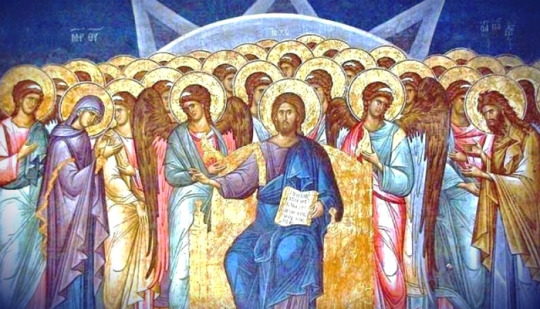
Christ shared our poverty that we might share the riches of His divinity: 'Our Lord Jesus Christ, though He was rich, yet for your sake became poor, that you through His poverty might become rich' (2 Corinthians viii,9). In Saint John's Gospel the same idea is found in a slightly different form. Christ states that He has given His disciples a share in the divine glory, and He prays that they may achieve union with God: 'The glory which Thou, Father, gavest me I have given to them, that they may be one, just as we are one; I in them, and Thou in me, that they may be perfectly one' (John xvii, 22-3). The Greek Fathers took these and similar texts in their literal sense, and dared to speak of man's 'deification' (in Greek, theosis). If man is to share in God's glory, they argued, if he is to be 'perfectly one' with God, this means in effect that man must be 'deified': he is called to become by grace what God is by nature. Accordingly Saint Athanasius summed up the purpose of the Incarnation by saying: 'God became man that we might be made God'.
Now if this 'being made God', this theosis, is to be possible, Christ the Saviour must be both fully man and fully God. No one less than God can save man; therefore if Christ is to save, He must be God. But only if He is also truly a man, as we are, can we men participate in what He has done for us. A bridge is formed between God and man by the Incarnate Christ who is both. 'Hereafter you shall see heaven open,' Our Lord promised, 'and the angels of God ascending and descending upon the Son of Man' (John i, 51) Not only angels use that ladder, but the human race.
Christ must be fully God and fully man. Each heresy in turn undermined some part of this vital affirmation. Either Christ was made less than God (Arianism); or His manhood was so divided from His Godhead that He became two persons instead of one (Nestorianism); or He was not presented as truly man (Monophysistism, Monothelitism). Each Council defended this affirmation. The first two, held in the fourth century, concentrated upon the earlier part (that Christ must be fully God) and formulated the doctrine of the Trinity. The next four, during the fifth, sixth, and seventh centuries, turned to the second part (the fullness of Christ's manhood) and also sought to explain how manhood and Godhead could be united in a single person.
-- Kallistos Ware, The Orthodox Church
3 notes
·
View notes
Text
My Extemporaneous Homily for Trinity Sunday
[This extemporaneous homily given today on the Feast of the Holy Trinity at The Chapel of St. George is transcribed from an audio recording. I added a few clarifying words to the transcription, but I’ve otherwise preserved the spontaneity of the form in which it arose and was originally shared. Subsequent to the Mass this morning, I’ve been reflecting a lot on the work of the éskhaton (the ‘last things’, the ‘completion’) and its relationship to related notions in other traditions. I will likely do some reflective writing on that to share with all of you soon. But, in the meantime, here’s my little ‘Word of Life’ from this morning’s Mass. May it bless.]
The concept that is really in my heart and mind this year as I reflect on the Feast of the Holy Trinity is ‘participation’. And I’m thinking of this in terms of a particular technical theological framework, which has real application for us, I think. It’s known as ‘participatory eschatology’. ‘Participatory eschatology’ simply means that the way the final or last things, the completion of things, comes about is through our direct participation in the divine work. That’s all it means. Rather than us sitting around waiting for something to come from the sky and magically change everything, we participate in that transformative power of the divine will, as it goes out into the whole of Creation, and, according to an ancient mode of Christian theology I very much embrace, eventually brings all life back into union with itself. That notion is called apokatástasis: the ultimate ‘wholling’ or re-union of all Creation.
We’re all invited to participate in that movement, in that divine unfoldment. And I think if the doctrine of the Trinity is worth anything, it’s that. It’s a reminder that we’re being invited to participate, not merely to have ideational constructs that sound fancy or that we’ve inherited and assumed as ‘beliefs’ without really understanding what they point to. If we get stuck there, we’re in trouble. And we’ve been stuck there a lot throughout the history of the Church, particularly in the West. We’ve been stuck a lot in ideas and beliefs. And that’s not a good place to be.
I’d like to read you something from the early Church. It’s a wondrous thing to look back at some of this theology—particularly the monastic witnesses from the early Church—and realize that a more expansive, breath-embracing understanding of Christian tradition was present in the beginning. It’s not a trend that we came up with because we wanted to conform the Church to our own modern ideas—it’s not that at all, actually. This expansive, mystical understanding of theology is really present in the early Church. This is from St. Macarius the Great. He says:
‘The soul that is found worthy to participate in the Holy Spirit and be illuminated by Her radiance, and by the ineffable glory of Her beauty, becomes Her throne and Her dwelling place. Such a soul becomes all light, all face, all eye. The soul becomes entirely covered with the spiritual eyes of light; nothing in it is left in shadow.’
Elsewhere St. Macarius also says that ‘God reveals God’s own nature to the soul and is discovered by the soul in direct knowledge (gnōsis), in wisdom, love, and faith….[with] the overseeing guidance of the spiritual intelligence’, so that the soul’s divine participation might blossom. ‘In short,’ he continues, ‘God made the soul like this so that it could be His own bride, that it might have communion with the Divine, to be merged in union with God, and so become as one spirit with God.’
That’s the journey, my friends—nothing less than that. To become merged in totalizing re-union with the Divine Ground: that’s our task. Not just to help a few things in the world here and there—that’s great too, but it’s really this divine re-union or ‘divinization’ (theosis) that we’re called to. In that, we participate directly in the life of the Trinity, in its spiritual economy: we are not looking at it as an object somehow removed from us, outside our direct experience, but we each become a Son or Daughter: we become another ‘Anointed One’, the Divine Child in Trinitarian reckoning, which lives and moves in unceasing communion with the Source, through the power and energy of the Holy Spirit. That’s what it means to be sanctified, to become a Saint.
And I want to say that we don’t have any more time to waste on anything short of this. I think you all have a sense—whether it’s consciously, not fully consciously yet, or whatever stage of processing you happen to be in—that the world is unraveling: the external world that we find ourselves in is unraveling. And we’re rushing head-long into these unprecedented modes and degrees of novelty, of bizarreness, of deconstruction and collapse: in our institutions, in the way we sustain ourselves on and with the Land, and all these other things.
So, we don’t have time anymore to be stuck in beliefs and strange ideas we don’t fully grasp the application of. That was a luxury of the past. And now it’s incumbent upon us to do what St. Macarius is pointing to: to engage this process of real interior transformation, so that the whole Creation may be helped in its transformation, to come back into union with its Source.
For these words, and all that has been offered here this morning, Amen.
Fr. B.+
#brendanelliswilliams#fatherbrendan#homily#sermon#mysticism#mysticaltheology#theology#spirituality#spiritualgrowth#trinity#transformation#ancient#wisdom#monastic#monasticism#ascetic#priest#teacher#spiritualteacher#spiritualdirection#contemplative#reflection#contemplation#depth#reclamation
3 notes
·
View notes
Text

Theosis - Partakers of the Divine Nature:
After the most recent post on Asceticism, it is appropriate to consider the goal of such discipline and aim of Philokalic spirituality. Simply put, it is the attainment of union with God and what the Fathers referred to as theosis or deification. St. Nicodemus of the Holy Mountain tells us that the Philokalia is the “instrument itself of deification.” Such a view is shared among contemporary Orthodox Christians: “Thus, the Philokalia, the single most important collection of Orthodox spiritual texts is, in effect, perhaps the best guidebook, next to the Bible, to the means of theosis. Its purpose is precisely to help us fulfill our calling to theosis or union with God” (Coniaris, “Philokalia: Bible of Orthodox Spirituality”, 132).
Theosis is the foundation, purpose and goal of life. This is expressed beautifully in Kenneth Leach’s introduction to Tito Coliander’s work “The Way of the Ascetics”: “Orthodoxy is not primarily a system or a correctness in doctrinal formulations. Doxa means glory. Orthodoxy is therefore concerned with ‘right glory,’ and it is therefore rooted in the sense of theology as inseparable from human transformation. The purpose of theology is nothing less than the transfiguring of human life ‘from glory to glory.’ At the center of Orthodox theology and spirituality is the theme of theosis, deification, the raising of manhood into God. This is the aim of the liturgy, the Eucharistic celebration which stands at the center of all worship and all life.” Thus, the “resourcement”, the return to the sources of our faith that was envisioned by Vatican II also and importantly includes rediscovery of the writings of the Philokalia. Such a rediscovery is important not simply in the quest for Christian unity. “It is essential if we are to recover that lost sense of the mystical and prayerful character of all theology. All theology is mystical theology; all theology is social theology. For it is rooted in ‘the life hidden with Christ in God’ and in the social life of the Holy Trinity. . .the way of the ascetics is not a gloomy, world-denying path; it is a way of doxa, of glory, whose aim is nothing less than our deification” (Colliander, “The Way of the Ascetics, ix-xi).
Sometimes in the busyness of life, which can include a kind of Christian activism, we can lose sight of our dignity and destiny: we can lose sight of the ultimate aim of God for sending his Son into the world to become man. We must return again and again to the words of the scriptures: “For God has made known to us in all wisdom and insight the mystery of his will, according to His purpose which He set forth in Christ as a plan for the fullness of time, to unite all things in Christ, things in heaven and things on earth” (Eph. 1:9-10) and “We know that, when He shall appear, we shall be like Him, for we shall see Him as He is” (1 John 3:2). God has created us for Himself and sharing in His life is our glorious destiny - to become, by grace, partakers of the divine nature. “In other words, the mystery of union between humanity, i.e., all of us and Christ is the ultimate aim of the incarnation, the crucifixion, the resurrection - nay, of creation as a whole. Thus, union with God is the foundation of the Church and the mystery of the Gospel. It was this union with God that Christ petitioned the Father to grant in our behalf when He prayed in John 17:21, ‘. . . that they also may be one in us’” (Coniaris, 133).
Theosis is not just a beautiful word and we must not reduce it to a theological concept; rather, it must be allowed to speak to everyday life - to penetrate and illuminate our trials, burdens and struggles. “Theosis has everything to say to struggling humanity. It tells us that we have the capacity through the presence of God within us to transcend and overcome any and every difficulty in life, including the greatest of all: death. Theosis tells us that we are not paupers, or beggars but sons and daughters of God, sharing His glory, partaking of His Nature, destined to inherit His eternal kingdom. Theosis tells us that we are more than conquerors through Him Who loved us. Theosis tells us to ‘hang in there’ no matter how hard the struggle or the temptation because God has great things in store for us. As St. Paul says, ‘I consider that the sufferings of this present time are not worth comparing with the glory that is to be revealed to us’ (Rom. 8:18)” (Coniaris, 137).
The means to Theosis is the grace of God and all the ways that He provides to draw us close to Him and to share His life with us; the sacraments, repentance, obedience to the commandments, reading the Word of God, faith, hope, love, service of neighbor, constant prayer, and the struggle of sin and temptation.
As we embrace all of these things we come to see the preciousness of the gift of our life and why it is worth living. “It is worth living because Christ loves you. It is worth living because Christ died for you and rose again to give you life. It is worth living because with Christ, life is both eternal and abundant. But life is worth living, above all because in Christ your destiny is theosis, becoming Christ-like, god by grace. Therefore, choose Christ and live. With Christ, life can be lived meaningfully, divinely, royally, victoriously, and eternally” (Coniaris, 145).
13 notes
·
View notes
Text
Ecstatic movement from the Good and Beautiful into the multiplicity of the good and beautiful, succeeded by joyful return to the Good and Beautiful. From God, in God, through God, to God. Abiding, procession, reversion; diffusion, illumination, union. Creation and consummation; theophany and theosis. Glory. Love. Bliss. The Dionysian vision, evoked in rhapsodic cadences and metaphorical invocations, captivates and delights, drawing us into the Mystery of the one God who is Holy Trinity.
Dionysian Ponderings: The Parhypostatic Nullity of Evil (x)
2 notes
·
View notes
Text
On the Contemplative Arc of Christianity
The Christian story of the “fall of man” is essentially an allegory about conceptual, dualistic thought obscuring the true nature of reality, and therefore cleaving one from its direct experience. This state of distinct existence apart from reality’s wholeness (or God by any other name) is in essence sin.
The seeming paradoxes strewn throughout the Gospel accounts (be they a virgin giving birth, divinity incarnate in human form, the dead waking, the blind seeing, or walking on water) are corrective metaphors, meditation upon which can work to align one’s perceptual and cognitive functions to a fuller experience of reality as ultimately indivisible, facilitating experiential (re)union as a salvific event.
Of course, reality owes us nothing. When it happens that things go our way, that those salvific insights dawn in our awareness, it’s both undeserved and unpredictable, that’s grace.
Recognizing the non-linear progression and befalling of grace, oft one is moved to not only a contemplative disposition that works to behold and savor even the most mundane moments of grace, but too, to act as an instrument of such grace when one realizes the power they have to do so in the lives of others and the world at large.
Through the self-emptying, co-equal participation in the dispensation of the grace that is ultimately and utterly enfolded in God as reality, one’s own place as experiencer of experience can break down and become transparent enough that every step taken is realized as a step into eternity, and every sight seen and sound heard transcends both time and space, and through this divinization (or theosis) is naturally manifest.
~Sunyananda

#zen#buddhism#buddha#buddhist#dharma#enlightenment#sangha#awakening#nirvana#spirituality#Christ#Christian#Christianity#religion#religious#spiritual#contemplation#contemplative#mystic#mystical#mysticism
1 note
·
View note
Link
For those that want to follow my reading on Theosis.
0 notes
Text
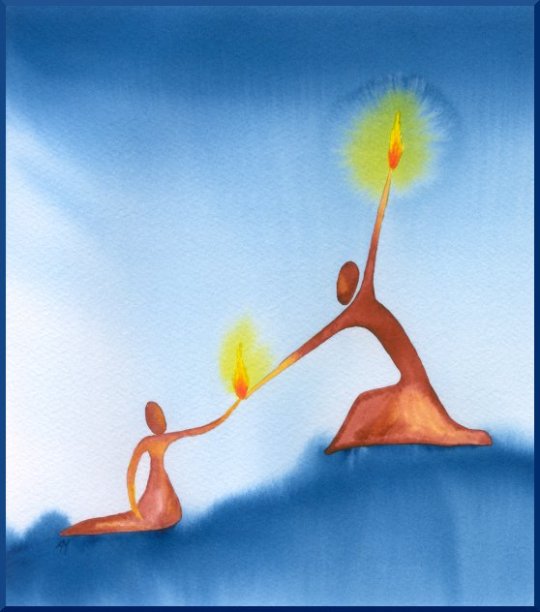
“The torch is not the flame, nor is the flame the torch. They are united to each other, but first the flame is of the torch. You are the torch and He makes you become light. The light that shines is His light; you will consume yourself for Him; you must live for Him and in Him. Therefore, you are the flame that shines, and the flame that shines is of that light which is He.”
~From Before The Dawn
(Art via viecontemplative.saintefamille.fr)
#torch#flame#God#light#You are His torch#live for God#mystical union with the Lord#Jesus Christ#theosis
12 notes
·
View notes
Text

1 note
·
View note
Photo


The Mystic Traveler Transcends the Universe (Ocean of Samsara) Through Meditation
"Association with a true Master [Satguru] is a prerequisite for the attainment of true spirituality (Parmarth). If the Sant Satguru is not met with, one may also achieve one's object by associating with a loving and devoted satsangi (initiate, disciple, representative of the Satguru) who has himself associated with him, is engaged in spiritual (Parmarthi) pursuits and is chosen of the Supreme Being Radhasoami Dayal [Compassionate Lord of the Soul], i.e., who is the recipient of his grace and mercy. When a sincere seeker learns the secrets and methods of practice from that satsangi and commences meditation practice (Abhyas), Radhasoami Dayal will take him under His protection and augment his love and faith by giving him palpable (perceptible, incontrovertible) help internally and externally." (Huzur Maharaj Rai Saligram)
"Raise your Surat [attention faculty of the soul] to higher regions where Dhun [the inner Sound] is audible all the time.
"Then you will make your human life truly fruitful and you will find rest and peace in Shabd [the Inner Sound and Light, Surat Shabd Yoga].
"The drum of breath is beating perpetually as a warning to eventual departure from here.
"Radhasoami has made available a boat. Get across the ocean of the universe free of any charge."
-- Soamiji Maharaj, Sar Bachan Radhasoami Poetry, Volume One
#mystic#mystic traveler#traveler consciousness#soul travel#surat shabd yoga#inner light and sound#meditation#out of body#oobe#nde#near death experience#ascension#union with God#theosis#divinization#gnosis#gnosticism#gnostic#mysticism#spirituality#third eye#inner space#Kingdom of God#within you#sant mat#radhasoami#eckankar#masterpath#science of spirituality#science of the soul
27 notes
·
View notes
Text
HOMILY for 25th Sunday after Pentecost
1 Thess 1:2-10; Matt 13:31-35
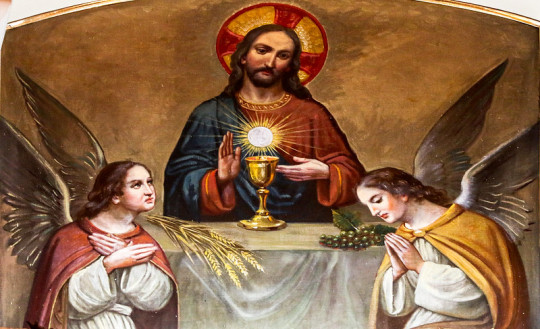
What are these things that have been “hidden since the foundation of the world”? What are the secrets of creation and our being that Christ now reveals and yet conceals through parables? For only those who have faith, and who listen attentively to the Word of God, will glimpse these hidden things. A few months ago, then, I said in one of these homilies that the mystical heart of the Gospel – the great mystery that sets the Christian Faith apart from all others – is an astonishing truth expressed in this pithy saying of St Athanasius: “God became Man so that Man might become God”, which is repeated by St Augustine, St Thomas Aquinas, and many other great theologians and saints of the West.
Someone who had been present in this church when that homily was preached was scandalised by this statement, and he was overheard in a pub to say so; coincidentally somebody who knows me overheard this and, with amusement, mentioned the incident to me. The notion that Man can be so united to God through charity and through sanctifying grace as to become a sharer in the divine nature is, indeed, for one who does not have the Catholic Faith, quite scandalous. Similarly, other religions have found the idea of God becoming Man quite ridiculous, even blasphemous. Yet both are asserted, even revealed, in Scripture.
Apparently, this person who had heard my sermon had thought that such a statement about Man’s divinisation through grace was tantamount to heresy, and perhaps the fault is entirely mine in not having explained this sublime doctrine clearly. So, permit me to try again, although if I really wanted to do this doctrine justice we’d need several years! But suffice to say, for now, that St Athanasius, reflecting on Scripture, explains that we are divinised by the grace of Christ, so that the divinity that is Christ’s by nature and truth is ours by adoption, by the transforming power of God’s grace, by the power of the Holy Spirit active in us that changes our behaviour and our desires so that we become loving, merciful, and benevolent as God is. For action follows on being; how we behave and what we love reflects who we are. Hence in today’s epistle St Paul says: “our gospel came to you not only in word, but also in power and in the Holy Spirit… And you became imitators… of the Lord”.
The Catechism of the Catholic Church, citing St Athanasius, and St Peter in Scripture, thus says: “The Word became flesh to make us "partakers of the divine nature":"For this is why the Word became man, and the Son of God became the Son of man: so that man, by entering into communion with the Word and thus receiving divine sonship, might become a son of God." "For the Son of God became man so that we might become God." "The only-begotten Son of God, wanting to make us sharers in his divinity, assumed our nature, so that he, made man, might make men gods.”” (CCC 460)
The Greek and Eastern Fathers of the Church have indeed been much more explicit in expounding the doctrine of theosis. Consider these words of St Basil the Great, bishop of Caesarea, who was a contemporary of St Athanasius and together with him fought off the Arian heresy that denied the divinity of Christ. St Basil explained the divinising work of God’s grace, saying: “From the Spirit comes a familiarity with heavenly things, our exultation with the angels. From him comes eternal joy; from him constant union with God and resemblance to him; and, most sublime of all, from the Spirit comes the possibility of becoming God.” St Clement of Alexandria, therefore, said that the Word of God became human so that “you may learn from a man how it may be that a man should become God.” The incarnation of Christ, therefore, and indeed, the gift of the Eucharist, is for the sake of our divinisation.
It is not accidental that the earliest exponents of this doctrine were also the greatest defenders of Christ’s divinity – they took seriously and earnestly the fact that in Christ God has become Man, taking on our humanity, and so they are could ponder thoroughly and seriously the mystery, the hidden thing, revealed by this divine action of the incarnation, namely, that a wonderful exchange should take place so that by his coming as Man, Christ might give us his grace, becoming the bridge that crosses the chasm between God and Man by uniting our humanity to his divinity. St Thomas Aquinas therefore, in a homily for Corpus Christi says that “Since it was the will of God’s only-begotten Son that men should share in his divinity, he assumed our nature in order that by becoming man he might make men gods.”
Many assume that this language is just metaphor or hyperbole, but the great Carmelite mystics, Doctors of the Church, such as St Teresa of Avila and St John of the Cross both spoke of divinization as the goal of the Christian spiritual life. Indeed, salvation and heaven means to become united to God, sharers in his divine nature, not that we become indistinct from God (for we remain creatures whereas God is Uncreated), but we become so like God that he acts in us, and moves us to act with charity. So the 14th-century Dominican Rheinland mystic John Tauler said: “What God has in himself by nature, that he now imparts to the soul by grace: the divine being, unnamed and without form or manner of existence that we can express. And now everything that is done in that soul God himself does, acting, knowing, loving, praising, enjoying… One can no more speak of this state clearly than he can speak clearly of the divine life itself. To men and angels it is far too high for expression.” St Paul too speaks like this when he says: “It is no longer I who live, but Christ who lives in me; and the life I now live in the flesh I live by faith in the Son of God, who loved me and gave himself for me.” (Gal 2:20)
Christ, therefore, in today’s parables reveals this marvel that has been “hidden since the foundation of the world”, which is that Man has immortal longings, and that God, at last, in Christ and through Christ, satisfies those longings. In the stained glass window at the very top and middle of this apse, therefore, there is a beautiful image of Christ as king, as the lover of the human soul, holding out the fruit of immortality, of divine life – the same fruit that Eve and Adam had tried to snatch. But now, because of Christ and by our share in his grace through the Sacraments of the Church, we are given the fruit of eternal life.
The parable of the woman who hid leaven in the flour, therefore, is an image of the Church who, through her Sacraments, leavens the dough of our humanity with the divinity of Christ. The leaven, which is the grace of Christ, is not just put in the flour, or sprinkled on top (as the Protestants think) but it is hidden deep within. For our sanctification means that we are moved and changed and divinised from the very depths of our being; holiness is not superficial, not merely external and cosmetic, but transformative of who I am. Hence, the leaven is hidden within us; God’s grace, as we heard in last Sunday’s readings, develops in a hidden way in us, and transforms us until we grow to maturity in Christ, becoming wholesome wheat. Similarly, today’s parable uses the imagery of flour measured out to become dough for bread: three measures of flour alludes to the Trinitarian action of sanctifying us, and the dough, like the wheat, of course alludes to the Eucharist.
For in the Eucharist Christ our God is hidden – latens Deitas, as St Thomas Aquinas says – so that as our food and as the bread of life he might divinise us from within. Thus St Augustine heard the Eucharistic Lord say to him: “‘I am the food of the mature; grow then, and your will eat me. You will not change me into yourself like bodily food: you will be changed into me.” God will make us into himself, into god. This is Christian doctrine for the mature in faith. Let us heed it, believe it, and thank the Lord for the wonders he does for Mankind!
5 notes
·
View notes
Text
some christian mysticism in Matthew
what jesus refers to as the kingdom of heaven/reign of god/etc depending on the translation is not an afterlife, but rather is life as opposed to metaphorical death, as we see with the young rich man in Matthew 19:16. this aspect seems to be preserved in orthodox christianity in the form of theosis, union with god through contemplative prayer. I don't know much theology, but in other words, it's an enlightenment practice. the 'reign of God' is a state of mind, and this stands whether or not there's an afterlife as well.
Matthew 19:16 And lo, [some]one having come near, said to him, ‘Good teacher, what good thing shall I do, that I may have life age-during?’ 17 And he said to him, ‘Why me dost thou call good? no one [is] good except One -- God; but if thou dost will to enter into the life, keep the commands.’ 18 He saith to him, ‘What kind?’ And Jesus said, ‘Thou shalt not kill, thou shalt not commit adultery, thou shalt not steal, thou shalt not bear false witness, 19 honour thy father and mother, and, thou shalt love thy neighbor as thyself.’ 20 The young man saith to him, ‘All these did I keep from my youth; what yet do I lack?’ 21 Jesus said to him, ‘If thou dost will to be perfect, go away, sell what thou hast, and give to the poor, and thou shalt have treasure in heaven, and come, follow me.’ 22 And the young man, having heard the word, went away sorrowful, for he had many possessions; 23 and Jesus said to his disciples, ‘Verily I say to you, that hardly shall a rich man enter into the reign of the heavens; 24 and again I say to you, it is easier for a camel through the eye of a needle to go, than for a rich man to enter into the reign of God.’
I've emphasized two aspects here, the first being the emphasis on life, and particularly the phrase "life age-during" which means something like "life lasting-until-the-end-of-the-age", until death.
I'm no scholar, but as far as I can tell, 'psuche' was a term which meant roughly 'life' and which had no connotations of an immortal soul in Homeric Greek, but was developing those connotations in late antiquity. the ancient Hebrew religion certainly don't seem to have had any concept of an immortal soul, and the Hebrew word translated as soul simply refers to life essence, or a breathing creature, etc. I recall offhand there are parallels between breath and life in Genesis, and the human life is kind of sustained by the spirit of god. we borrow one 'soul', at best. I have no idea whether Jesus had adopted that concept of an immortal soul or not, but it would be a deviation from the old religion, which Jesus kind of insists he doesn't want to do.
the second aspect, the treasure in heaven, is often thought to refer to pie in the sky when he dies, but it's drawing on the sermon on the mount. the enlightenment practice is achieved by way of placing one's treasure in heaven, after which one's heart will follow. "ok, you think you're doing it right but you're not getting results? go give to the poor and place your treasure in service, and your heart will follow."
in the sermon, Jesus gives advice along the lines of how to make sure prayers are genuine, that fasting and other such practices are genuine. that one does not do them for the admiration of others, for egoistic ends, but actually places one's treasure in 'heaven'. if one treasures admiration, one's heart will seek admiration. but if we pray in secret, obscure the indications of our fasting, etc. then our actions will be conducive to changing our hearts.
6:16 ‘And when ye may fast, be ye not as the hypocrites, of sour countenances, for they disfigure their faces, that they may appear to men fasting; verily I say to you, that they have their reward. 17 ‘But thou, fasting, anoint thy head, and wash thy face, 18 that thou mayest not appear to men fasting, but to thy Father who [is] in secret, and thy Father, who is seeing in secret, shall reward thee manifestly. 19 ‘Treasure not up to yourselves treasures on the earth, where moth and rust disfigure, and where thieves break through and steal, 20 but treasure up to yourselves treasures in heaven, where neither moth nor rust doth disfigure, and where thieves do not break through nor steal, 21 for where your treasure is, there will be also your heart.
I am endeavoring to think more carefully about what I treasure. for instance, why am I writing this? shouldn't I be out doing service to others? or is this an act of service? I don't know if I can answer right now, but what I do know is if I treasure the service more than my ego, I will gradually mitigate the influence of that ego and the results will speak for themselves.
1 note
·
View note
Text
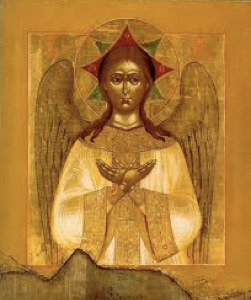
The Characteristics of a Distinctive "Philokalic" Spirituality:
From all appearances the Philokalia seems like a mere collection of texts written by 36 different authors. Indeed, Kallistos Ware reminds us, the word Philokalia can signify “a love what is beautiful and good, love for God as the source of all things beautiful.” But, he continues, it can also simply mean “anthology”. When a person picks up the Philokalia, the second meaning seems to be the dominant one. Ware states: “The different texts are given simply in chronological order, with no attempt at systematic classification, no grouping of topics, and no clear indication which writings are considered suitable for ‘beginners’ and which for the more ‘advanced.’” But when we begin to look deeper, dominant motifs and master themes emerge which, Ware states, “give to the Philokalia a coherent unity and a definite purpose.”
According to Ware, the first theme and general scope of the Philokalia is Inner Action. The Philokalia is concerned with the interior life. It is not concerned with bodily asceticism, although this of course is discussed and a necessary part of the spiritual life, but rather with “guarding the intellect.” “What it reveals to us, says St. Nikodimos in his preface, is ‘the kingdom of God that is within you, . . . the treasure hidden in the field of the heart.’” This kingdom within is characterized by two fundamental virtues - nepsis and hesychia. Nepsis “is a term denoting sobriety, temperance, lucidity and above all vigilance and watchfulness.” Hesychia “signifies not so much exterior silence as inner stillness of heart.” These two virtues, which we will discuss further in later posts, foster greater freedom from the thoughts and fantasies often associated with our passions and give rise to pure prayer free of all images and discursive thought.
The second theme, according to Ware, describes the basic aim of the Philokalia: Deification or theosis - a direct, transforming union with God. St. Nikodimos in the first sentence of his preface to the Philokalia writes: “God, the blessed nature, perfection that is more than perfect, the creative principle of all that is good and beautiful, Himself transcending all goodness and all beauty, in His supremely divine plan preordained from all eternity the deification of humankind.” Simply put, the supreme end of the spiritual life is to be one with God through having his image and likeness perfected within us.
The third and final theme discussed by Ware is the means of this Deification: the Continual Invocation of the Holy Name. The grace bestowed on us at baptism is obscured by our sin and through being immersed in worldly cares and controlled by our passions. Once again in the preface to the Philokalia, Nikodimos tells us how this grace can be reactivated: “The Spirit. . . revealed to the Fathers a method that is truly wonderful . . .whereby grace can be rediscovered. This was to pray continually to our Lord Jesus Christ the Son of God, not simply to pray with the intellect and the lips alone; . . . but to turn the whole intellect towards the inner self, which is a marvelous experience; and so inwardly, within the very depths of the heart, to invoke the all-holy Name of the Lord and to implore mercy from Him, concentrating our attention solely on the bare words of the prayer, not allowing anything else whatever to gain entry from within or from without, but keeping the mind totally free from all forms and colors.” When we engage in this spiritual work and live in accord with the commandments then we begin to “return to the perfect grace of the Spirit that was bestowed upon us in the beginning through Baptism.”
As we begin our study of the Philokalia at the Oratory, and in later posts we will be discussing in depth these and approximately 20 other related themes of “philokalic” spirituality and examine how these themes are developed by particular writers.
Quotes from, “The inner unity of the Philokalia and its influence in East and West” by Kallistos Ware, pp. 6-10. Edit. Alexander S. Onassis Public Benefit Foundation, Athens 2004.
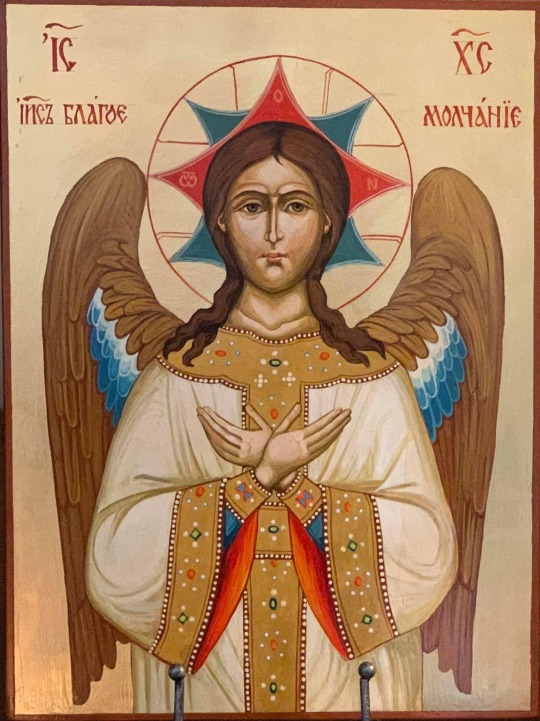
9 notes
·
View notes